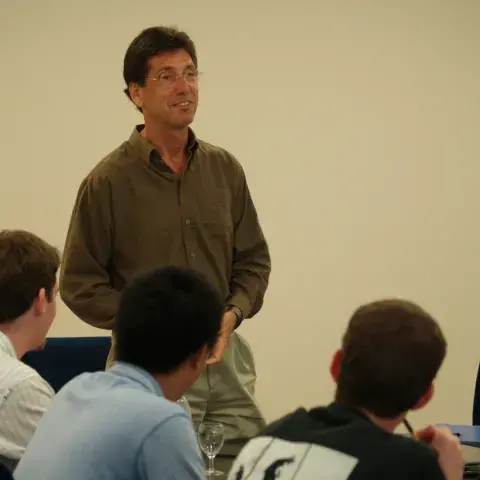
Dr. Warren Mosler is an American economist, fund manager, entrepreneur, financial professional and the founder of Modern Money Theory, a distinct macroeconomic theory that opposes the mainstream understanding of money. In addition, Dr. Mosler has changed the narrative of how money works in his latest book "The Seven Deadly Innocent Frauds of Economic Policy" and, on this basis, he developed a non-mainstream macroeconomic theory that has become increasingly popular in the last few years.
At Franklin, Dr. Mosler has sponsored and funded a series of lectures between 2008 and 2014, when also awarded an honorary doctorate during the 2014 Commencement. He since then has been a guest speaker on campus on numerous occasions, one of the most recent during the Spring '21 semester – more here – in a Masters in Political Economy of Money and Development class.
In this short interview, Dr. Mosler explains his views on the current state of the United States economy.
Franklin: All the measures of inflation in the United States are well above the Federal Reserve's target of 2%. The Chair of the Federal Reserve, Jerome Powell, said that the process of reopening the economy after the COVID-19 shutdowns is causing upward pressure on prices but sees no immediate threat of inflation. The former United States Treasury Secretary, Lawrence Summers, is of a different opinion and believes that Powell is misreading the risks of inflation. Do you agree that there is no threat of inflation in the United States? What do you think is the cause of the current spurt of inflation? Will this be transient or could become persistent?
Dr. Mosler: What we are seeing is price adjustments to supply shocks, from both the (Trump and now Biden) tariffs and disruptions from COVID-19. Oil prices are rising simply because of Saudi Arabia's pricing with cooperation from Russia. The price is their political decision. How it will move in the future is anyone’s guess. Other prices like lumber and iron are showing signs of transitory supply chain issues. On the other hand, wage growth has lagged the increase in prices, and excess capacity persists as employment has only partially recovered. Even with the current fiscal spending, there are few signs of excess demand behind the rise in prices. So no, I don’t see an inflation story.
Franklin: You mentioned that tariffs on China are one reason for higher prices in the United States. What is your view of the Trump (and now Biden) trade policies with China? Is this trade war worth fighting?
Dr. Mosler: It's a policy that works in favor of United States exporters, at the expense of the United States macro economy. Fundamentally, exports are real costs to the country, and imports are real benefits. This is because real wealth consists of all you produce domestically plus all you import, minus all you export. Both political parties have it backward. Tariffs are increasing costs for consumers that reduce consumption the way a tax does, in the hope of shifting production to domestic firms, tying up labor that could better be used elsewhere, which reduces total potential domestic output.
Franklin: Should the Federal Reserve instead view a danger of inflation, it will probably raise interest rates, in the hope that this will slow down business and households borrowing, slow down spending, and hence put downward pressure on inflation. In your view, should the Federal Reserve take this course of action, what would be the most likely effects on the United States economy?
Dr. Mosler: It will be very small as the rate hike will likely be very small, so it would be hard to detect any effect. In theory, it would add a bit to aggregate demand and to inflation!

